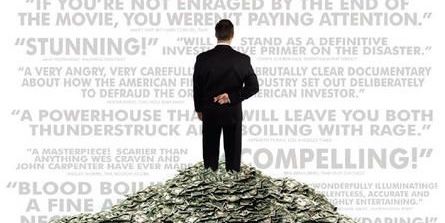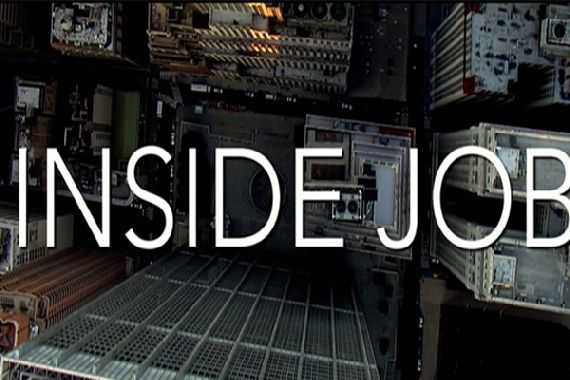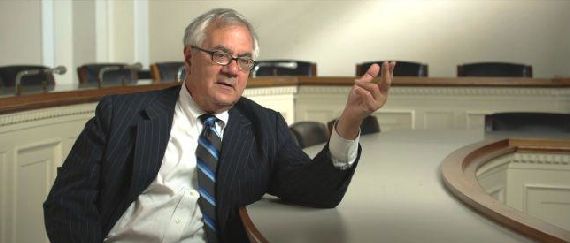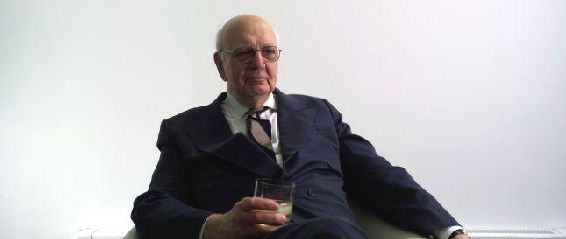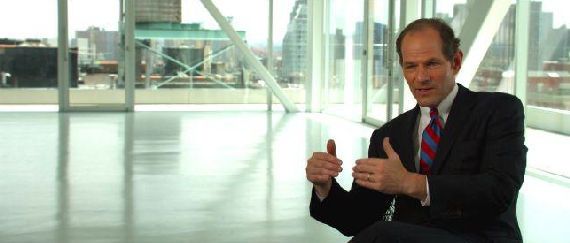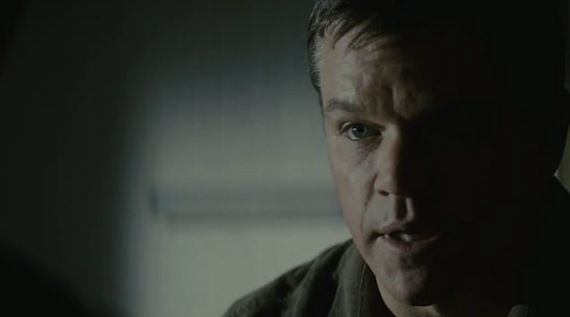Screen Rant's Kofi Outlaw reviews Inside Job
Inside Job is the newest documentary from Charles Ferguson, the Oscar-nominated filmmaker behind No End in Sight, a documentary that pondered the long-term impact of the U.S. invasion of Iraq.
With Inside Job, Ferguson once again performs a much needed public service, piercing the veils of mass media and politics in order to offer a comprehensive and accessible look at the root causes behind the 2008 global economic crisis.
Politics were raging back in 2008, but no matter what side of that line you stood on, all Americans (and many citizens of the world beyond our borders) were gripped by fear as the American economy (and thereafter the global economy) ground to a halt with the collapse of AIG, one the largest insurance corporations in America.
The crisis began when (and I'm delivering a very simplified version of this) AIG's credit ratings were discovered to be worth far less than many within the financial services industry had speculated and traded on. All of a sudden, the largest insurance corporation in America was being called on to cover the cost of loans and debts it had no money to pay for. This led to one of the cornerstones of the American economy being crippled, trillions in investment losses, and a mystery that no one in a position of power (including America's new president) seemed able to answer - namely, why did this happen?
Well, some two years later as the world is still trying to sift its way out of this latest Wall Street blunder, Charles Ferguson is doing what so many world leaders and economists could not: explaining how Wall Street cause global economic near-collapse in clear, concise terms that any layman could understand.
With methodical precision, Ferguson looks at American investment policies of the past decades and how those policies were deregulated over time, giving rise to an age of speculative investment banking, high-stakes trading, and the mad-dash for big fortunes which fuels it all.
There are two aspects of Inside Job which truly distinguish it as a great documentary: the organized manner in which Ferguson presents his information and the cast of "characters" he has interviewed.
As to the former: Ferguson wisely uses time as his guide, looking at the history and progression of the U.S. financial sector - from a highly regulated system of simple borrow/lender relations, to the complicated system of high-risk loans and derivatives it is today. Here are the epochs of history that serve as the documentary's "chapters":
- 1930s - 1979 - Post-Depression era of "Traditional American finance." A look at all the safeguards put in place in wake of the Depression that kept financial services resigned to a simple system of borrowers and lenders (banks) who actually had the money to lend. Bankers and traders earned income that matched most working Americans.
- 1980s - Reagan era of laissez-faire business and trickle-down economics. The deregulation of Wall Street and the savings and loan industry leads to less oversight, and soon after multiple cases of fraud, insider trading and bad loans/investments that lead to massive losses.
- 1990s - Clinton era and the bridge between Washington and Wall Street. More and more Wall Street CEOs infiltrate the government, taking up administrative positions. Depression era safeguards are repealed, allowing for huge Wall Street mergers and new laws favoring the financial services industry. The derivatives industry is created, which Wall Street government administrators refuse to regulate. Bankers/traders now make huge commissions off "junk deals" that lead to the Dot-com bubble burst. The financial sector is ultimately given a slap on the wrist.
- 2000s - The Bush era of further deregulation and relaxed enforcement. With lax laws on regulation and oversight, more and more cases of heavy lobbying, fraud, inflated speculation and unethical practices arise. Complex systems of investment are created, which tie everything from mortgages to credit up in the risky practices of the financial services industry. The result: inflated speculation and unethical practices by the nation's leading finance, insurance and credit rating agencies, leading to the 2008 economic collapse.
- 2008 - The Great Recession. A look at the fall of dominoes that brought down America's biggest financial, insurance and credit rating agencies. Corrupt CEOs and their cohorts still walk away with massive fortunes, and more than a few of them still hold government positions.
- 2010 - The Obama era: Business as usual. A look at how - despite all the campaign promises of "Change we can believe in" - the Obama administration is in fact employing the very same Wall Street execs-turned-government administrators who have pitched the U.S. into multiple financial crises over multiple decades of unethical practices.
As you can see, this documentary doesn't get bogged down in the illusions of politics, but rather pierces that veil to reveal the truth: that there is very specific sector of American industry that has repeatedly proven toxic when left unregulated and unattended. To quote a great man, "Cash rules everything around me..." Politics be damned.
Continue to the "characters" and criticisms of Inside Job...
The "characters" that Ferguson features in his documentary are by far the most interesting and engaging aspect of the film. That "cast" includes:
- Multiple economists ranging from those who have been warning for years about the dangerous practices of Wall Street, to those who have been downplaying that danger.
- Bankers/Traders - both the moral and immoral types.
- Government officials who have direct ties to the financial sector.
- Educators from top universities who are involved (often unethically) with the financial sector.
- Advocates of social reform and justice.
- Foreign economists/government officials who have mapped the ripple effect of Wall Street malpractice.
- A psychotherapist who treats Wall Street execs and the escorts who service them.
- A madam whose primary clientele was Wall Street execs.
Truly, some of Inside Job's best moments come from the unexpected detours Ferguson takes into the psychology and seedy private behavior of high-ranking Wall Street types. A definite pattern quickly emerges in which the same people who are thrilled by high-stakes investing and ludicrous greed are equally thrilled by money, drugs and prostitutes, often at taxpayer expense. The two worlds - financial services and illicit vice - seemingly go hand-in-hand.
Another big revelation of this film: some of the people responsible for the "academic stamp of approval" that legitimizes many fraudulent reports published by Wall Street are the same people heading up America's leading business schools today (Yale, Harvard, Columbia, etc...). In fact, Ferguson's interviews with two of these esteemed academic names about their obvious unethical behavior are so damning that I'm not sure the two men will keep their jobs should this film gain notoriety. It's a clear case of journalistic victory, captured on camera.
If I have to criticize Inside Job it has to be on two points: first, there is a ton of material that Ferguson presents, but a lot of the social impact is only discussed superficially. Of course, looking at every ripple caused by the global financial crisis of 2008 would result in a three to four-hour documentary, and admittedly Ferguson is wiser to stay tightly focused on his primary subject (the financial services sector). But despite offering viewers a concise narrative, you can't watch Inside Job without getting the nagging feeling that there's much more going on that ties into what Ferguson is discussing; not getting that correlating info can be a bit frustrating at times.
The same goes for the lack of commentary from many of the major players (top CEOs turned government officials) being discussed int the film. While Ferguson does manage to get commentary from an impressive array of specialists, not having some of the top dogs on record robs the film of being an indisputably objective and complete look at this subject.
The second criticism I have is with Ferguson's choice of narrator for the film: actor Matt Damon. Sure, Damon's voice will be a welcome guide for many viewers, but having a well-known actor with pronounced liberal views speaking for what is essentially a non-partisan film is a misstep, in my opinion. Damon's presence will give easily-swayed or politically fundamental viewers an excuse to slap this film with the label of "liberal propaganda" based on that celebrity association alone, and this film is far from being partisan in any way.
Those small criticisms aside, Inside Job is an accomplishment that does what a great documentary should: present an important societal topic in a way that is accessible and comprehensive to a mainstream audience. And, as the film states in its final moments, the continuing malpractices of Wall Street are a crime for which few have been punished, but damage of which continues to threaten our very way of life. We've been officially warned.
Watch the trailer for Inside Job to help you make up your mind:

